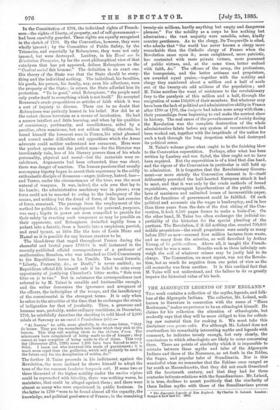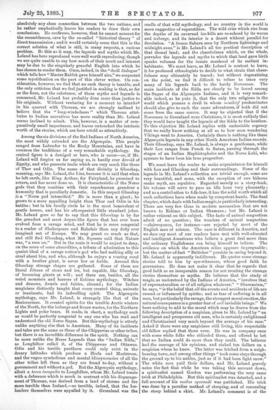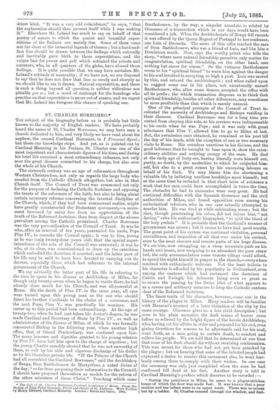THE ALGONQUIN LEGENDS OF NEW ENGLAND.* Tins work contains a
collection of the myths, legends, and folk- lore of the Algonquin Indians. The collector, Mr. Leland, well- known to literature in connection with the name of "Hans Breitmann," makes no pretence to be an ethnologist himself. He claims for his collection the attention of ethnologists, but modestly says that they will be more obliged to him for collect- ing raw material than for cooking it. We must take this disclaimer cum grano sails. For although Mr. Leland does not overburthen his remarkably interesting myths and legends with comment, he indicates tersely enough, but vefy clearly, the conclusions to which ethnologists are likely to come concerning them. There are points of similarity which it is impossible to mistake between these myths and tales of the Algonquin Indians and those of the Norsemen, as set forth in the Eddas, the Sagas, and popular tales of Scandinavia. Nor is this wonderful when we remember that the Eskimo once ranged as far south as Massachusetts, that they did not reach Greenland till the fourteenth century, and that they had for three centuries intimate relations with the Scandinavians. Mr. Leland, it is true, declines to assert positively that the similarity of these Indian myths with those of the Scandinavians proves
• The Algonquin Legends of New England. By Charles G. Le/and. London : Samps( n Low and Co. 1885.
absolutely any close connection between the two nations, and he rather emphatically leaves his readers to draw their own conclusions. He confesses, however, that he cannot accoupt for the resemblances, save by the so-called "historical theory" of direct transmission ; and it would certainly seem that this is the correct solution of what is still, in many respects, a curious problem. Be this as it may, the legends and myths which Mr. Leland has here reproduced were well worth reproducing, though we are quite unable to say how much of their merit and interest may be due to the singularly graceful English into which he has chosen to render them. Once, indeed, in the "droll dialogue" which tells how "Master Rabbit gave himself airs," we suspected some mystification on the part of this clever writer. On con- sideration, however, we find that no such theory is tenable, and the only criticism that we feel justified in making is that, so far as the form, not the substance, of these myths and legends is concerned, Mr. Leland has probably done more than justice to his originals. Without venturing for a moment to interfere in his quarrel with Thoreau, we are strongly inclined to believe that the " long-windedness " which Thoreau attri- butes to Indian narratives has more reality than Mr. Leland seems inclined to admit. This, however, is a matter of com- paratively small importance, and leaves untouched the intrinsic worth of the stories, which are here retold so attractively.
Among the six divisions of the Red Indians of North America, the most widely extended are the Algonquin. This people ranged from Labrador to the Rocky Mountains, and have in common the traditions of a very remarkable mythology. Its central figure is a demigod or hero, who is never—or, if Mr. Leland will forgive us for saying so, is hardly ever devoid of dignity, and who presents traits which are very much like those of Thor and Odin. The name of that divinity is Glooskap, meaning, says Mr. Leland, the Liar, because it is said that when he left earth, like King Arthur, for Fairyland, he promised to return, and has never done so. It is characteristic of the Norse gods that they combine with their superhuman grandeur a humanity that is peculiarly domestic. In this respect Glooskap is a "Norse god intensified." He is more than a giant ; he grows to a more appalling height than Thor and Odin in his battles ; but in his family circle he is the most benevolent of gentle heroes, and has his oft-repeated little standard jokes. Mr. Leland goes so far to say that this Glooskap is by far the grandest and most Aryan-like figure that has ever been evolved from a savage mind, and that he is more congenial to a reader of Shakespeare and Rabelais than any deity ever imagined out of Europe. We may grant so much as that, and still find Glooskap, what Mr. Squeers said that Nature was, "a rum an." But in the main it would be unjust to deny, on the score of some absurdities, a tribute of admiration to this quaint ideal of a savage nation's god who had nothing silly or cruel about him, and who, although he enjoys a roaring revel with a brother giant, is never low or feeble. Around this Glooskap strange shapes are gathered. Some of them are literal Jotuns of stone and ice, but capable, like Glooskap, - of becoming giants at will ; and there are, besides, all the weird monsters and horrors of Eskimo mythology. Witches and demons, dwarfs and fairies, abound ; for the Indian magicians distinctly taught that every created thing, animate or inanimate, had its indwelling spirit. The Algonquin mythology, says Mr. Leland, is strangely like that of the Rosicrucians. It created spirits for the terrible Arctic winters of the North, for the icebergs and frozen wastes, for the Northern Lights and polar bears. It made, in short, a mythology such as would be perfectly congenial to any one who has read and understood the old Norse Sagas. But this mythology is utterly unlike anything else that is American. Many of its incidents and tales are the same as those of the Chippewas or other tribes, but there is an incredible difference in the spirit. Nothing can be more unlike the Norse Legends than the 'Indian Edda," as Longfellow called it, of the Chippewas and Ottawas. Odin and his terrific pantheon could only exist in the dreary latitudes which produce a Hecla and Maelstrom, and the vague symbolisms and mental idiosyncrasies of all the other tribes left them as they are found to-day, without a government and without a god. But the Algonquin mythology, albeit a terra incognita to Longfellow, whom Mr. Leland treats with a deference which is much in contrast with his disparage- ment of Thoreau, was derived from a land of storms and fire more terrible than Iceland,—so terrible, indeed, that the Ice- landers themselves were appalled by it Greenland was the
cradle of that wild mythology, and no country in the world is more suggestive of superstition. The wild cries which rise from the depths of its caverned ice-hills are re-echoed by its waves and icebergs, and its interior is a desert without parallel for desolation. "A frozen Sahara seen by Northern lightnings and midnight suns," is Mr. Leland's all too poetical description of that dismal land ; and the cheerfulness which, on the whole, pervades the legends and myths to which that land gave birth speaks volumes for the innate manhood of its earliest in- habitants. We must leave, as Mr. Leland is content to leave, it for professed ethnologists to decide to what strain that cheer- fulness may ultimately be traced ; but without dogmatising on the point, we find it difficult to refuse to trace very many of his legends back to the hardy Norseman. The main incidents of the Edda are clearly to be found among the Sagas of the Algonquin Indians, and it is very remark- able indeed, as he puts it, that the only two religions in the world which possess a devil in whom mischief predominates should also give to each the same adventures, if both did not come from the same source. It may be objected that if the Norsemen in Greenland were Christians, it is most unlikely that they would have taught the legends of the Edda to the heathen
To this objection Mr. Leland replies with undeniable cogency that we really know nothing at all as to how soon wandering Vikings went to America. Certainly there is nothing like these Algonquin legends in any other North American Indian records. Their Glooskap, says Mr. Leland, is always a gentleman, while their Lox ranges from Punch to Satan, passing through the stages of an Indian Mephistopheles and the Norse Loki, who appears to have been his true progenitor.
We must leave the reader to make acquaintance for himself with Lox and Glooskap and their surroundings. Some of the legends in Mr. Leland's collection are trivial enough, some are very beautiful, and none, with the exception of one hideous snake myth, are repulsive. Regarded merely as a story-book, his volume will serve to pass an idle hour very pleasantly; and as a contribution to folk-lore, it has the solid worth which all such collections have when made by competent hands. The final chapter, which deals with Indian magic,is particularly interesting. There are very few ideas in modern mesmerism that are not known to Eskimo or Indian Shamans ; but Mr. Leland is rather reticent on this subject. -The facts of animal magnetism admit of no question ; the wonders of animal magnetism —clairvoyance, for instance—are rejected by most of the English men of science. The case is different in America, and we dare say most of our readers have met with well-educated and intelligent Americans who believe a great deal more than the ordinary Englishman can bring himself to believe. The evidence on which the American relies appears impregnable;. but the matter-of-fact " Britisher " persists in seeing beyond it. Mr. Leland is apparently indifferent. He quotes some strange stories told to him by eye-witnesses, whose good faith he guarantees. He does not make it clear that he regards that good faith as an insuperable reason for not treating the strange stories themselves as myths. He believes that the study of magic, as understood by the Indians of America, "involves that of supernaturalism or of all religion whatever." "Shamanism," he says, "is the belief that all the events and accidents of life are caused or influenced by spirits ; and as fear of suffering is in all men, but particularly the savage, the strongest moral emotion, the natural consequence is a greater fear of evil invisible beings." We have nothing to add to the moral which may be drawn from the following description of a magician, given to Mr. Leland by" an intelligent and prosperous old man, who is certainly enlightened and Christianised very much beyond the average of his race." Asked if there were any magicians still living, this respectable old fellow replied that there were. He was in company once with some white folks who ridiculed them, and offered to bet that no Indian could do more than they could. The believer had the courage of his opinions, and staked ten dollars on a magician whom he knew. The latter was fetched from a neigh- bouring town, and among other things "took some steps through the ground up to his ankles, just as if it had been light snow.' The white men paid their dollars, and Mr. Leland gravely notes the fact that while he was taking this account down, a spiritualist named Gordon was performing the very same trick at Philadelphia. But this spiritualist was detected, and a full account of his modus operandi was published. His trick was done by a peculiar method of stooping, and of concealing the stoop behind a skirt. Mr. Leland's comment is of the
driest kind. "It was a very odd coincidence,'" he says, "that the explanation should thus present itself while I was seeking it." Elsewhere Mr. Leland has much to say on behalf of that poetry of nature to which the quaint and beautiful super- stitions of the Indians are mainly due. Some of them come not far short of the immortal legends of Greece ; but a hard-and- fast line should be drawn between the feelings which naturally and inevitably gave birth to those superstitions, and the vulgar lust for power and pelf which actuated the priests and sorcerers, who, in all quarters of the globe, have abused those feelings. It is quite possible that we may have mistaken Mr. Leland's attitude of neutrality; if we have not, we are disposed to say that he does not draw that line so surely and sharply as we should like to see it drawn. Natural superstition, and there is such a thing beyond all question, is neither ridiculous nor pitiable per se; but a word of contempt for the humbugs who practise on that superstition is never out of season, and we regret that Mr. Leland has foregone this chance of speaking one.




































 Previous page
Previous page